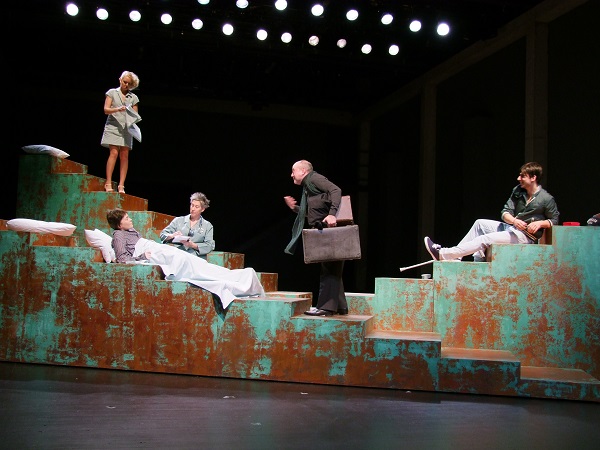
The Theatre National de Luxembourg is currently hosting a series of six performances of 5 one-act dramas by Tennessee Williams (in English), entitled "Mister Paradise and other rare electrical things", and directed by Luxembourg's Anne Simon.
Williams may be best known for his stage plays The Glass Menagerie, A Streetcar Named Desire, Cat on a Hot Tin Roof and A Streetcar Named Desire, but he also wrote a number of short one-act plays too. Here, Anne Simon has brought five of the them together and, along with four fine actors, has brought them to Luxembourg audiences. The Luxembourg Chronicle got the opportunity on Thursday to attend Opening Night and was far from disappointed.
The main thing with Luxembourg's National Theatre is that it feels more rural and homely than many of the larger and newer purposely-built auditoria that have sprung up over the years. From relaxing over a drink beforehand in the spacious bar and salon area, the doors are ceremoniously opened for the audience to find a seat on the tiered benches peering down on the cavernous stage area. For this production, almost the entireity of the cavern has indeed been used, and to great effect, particularly regarding depth. When Simon wanted the actors and their dialogue to be up close to the audience, either soft or in-your-face-loud, the three-sets-of-stairs set was configured accordingly; also when depth was needed with people entering or leaving through a staircase, this was equally impressive. The simple lighting apparatus achieved their dramatic effects to offer a polished production in every sense.
One can assemble great actors, but to achieve a great cast is another thing altogether: here, Simon has also excelled, with the performances justifying the casting without exception. Together with the wardrobe and make-up departments, it seemed as if there were a dozen or so people on stage, but there were actually only four; and four incredible sets of performances. Congrautulations to Steve Karier (who seemed to receive most reaction from the audience), Christine Probst-Staffen, Elisabet Johannesdottir and Daron Yates.
In all the five plays, Williams examines the issue of conformity versus freedom, all in different settings and in different ways.
Mister Paradise (1939): the protagonist discovers Anthony Paraside living in an old French Quarter of New Orleans after discovering a book of poetry in a bookshop written by him, but she gets a surprise when she meets him, not getting what she expected as he refuses to compromise his art.
The Big Game (1937): set in a hospital ward (there were SURELY more than 4 characters on set at any one time!) one patient is about to be released after successful surgery and hopes to regain his professional sports career, another has a weak heart and the other is in for a brain operation.
Lily, why do you smoke too much (1935): Lily's mother wants her to conform and to find a husband after being schooled and educated on expensive foreign trips, but Lily is rebellious, with the mother-daughter relationship strained.
The Fat Man's Wife (1938-9): Upon returnign home after a New Year's Eve party, the Fat Man and his wife argue over who the other was talking with at the party, each looking for escapism.
The Municipal Abbatoir (revised 1948): a surreal drama unconnected with the other pieces focusing on respecting authority and not questioning instructions.
Tickets for the remaining performances (Saturday 9 Jan @ 20:00, Saturday 16 Jan @ 20:00, Sunday 17 Jan @ 17:00, Thursday 21 Jan @ 20:00 and Friday 22 Jan @ 20:00) are available online from www.luxembourg-ticket.lu or by tel: 470895-1 (Mon-Fri 10:00 – 18:30). The evening box office is open 30 minutes prior to each performance.
Photos by Geoff Thompson








